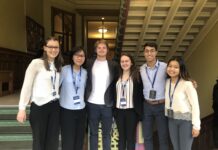Following the University of Waterloo’s formal promise of reconciliation, UW president Vivek Goel hopes to see the Waterloo at 100 initiative continue to confront broader changes in society.
Waterloo at 100, as described on the office of the president’s website, is an “exercise to develop a longer-term vision that will address: What do we as an institution aspire to become by our 100th anniversary in 2057?” Goel explained the initiative as a chance to make “substantial change,” reflecting on UW’s history of innovation in the face of global challenges, with those surrounding its founding including the Cold War and the space race.
“It’s, to me, important for us to be thinking about what our contribution is, in the face of these big global challenges; how we prepare our students, our graduates and alumni to be leaders in [the] society that we’re going to be facing,” he said, referring to current issues like the COVID-19 pandemic, polarization in politics and the climate crisis.
Though the university regularly creates five-year strategic plans, the most recent of which is the 2020-2025 “Connecting Imagination with Impact” plan launched under former UW president Feridun Hamdullahpur, Goel noted the limitations of the shorter time frame in its restricting the ability to create “substantial change” for the institution, pointing out the opportunity of Waterloo at 100 to tackle larger initiatives like the formal promises to reconciliation.
A discussion paper regarding the Waterloo at 100 initiative was released this fall, compiling the results of preliminary consultations with over 1000 community members of UW, both internal and external. The discussion paper includes five “Interconnected Futures,” which “[align] to our present and growing strength areas…, through which our impacts can be made,” including “Sustainable Futures” and “Technological Futures.” The paper also includes three forecasts: graduates, knowledge, and campus, meant to serve as “longer-term horizons for present and future strategic initiatives.” These stem from “white papers”: framed discussion papers based on group discussions regarding what the final discussion paper might look like.
Goel stated that the discussion paper sets the ground for further discourse, to which he hopes to see the UW community bring their “bold, aspirational ideas.”
“We don’t presume to have all the answers,” Goel said. “And as we start to see themes coming together, that are shared by many members of the community, that will find its way into the final paper, which we hope will be ready in 2023 and will go to the Senate for endorsement.”
Though the initiative would likely not impact current students’ experiences, he said, their experiences would hopefully inform the institution and the experiences of future students.
Despite the rounds of consultation the initiative has gone through, with two sessions each allotted to faculty, staff and students, not all UW students are aware of or invested in the Waterloo at 100 initiative.
“I’m gonna be honest, probably not,” said Jason Trinidad, a second-year honours arts and business student, in response to whether or not he would have participated in the consultations. He voiced concern with the unstable nature of the university’s plan, with its effectiveness dependent on the amount of attention invested both by the university and the student body in achieving the initiative’s goals.
“I don’t know how much resources they’re willing to put in to accomplish [their goals], cause if they’re putting more time, effort and money, then I feel like there’d be a higher possibility that they’d achieve those goals,” Trinidad said. “But… especially if they look at [how] most people don’t really know or pay attention to [the initiative], they’re gonna feel less inclined to make big changes or to invest more into doing those things, therefore lowering their chances of execution.”
He also mentioned the need for better awareness of the initiative across campus, which could also increase participation amongst the student body. “I feel like if it were made more known across campus, then more people would participate… looking at the big picture, I think it’s a good initiative or idea, but for me personally, I don’t choose to participate in those things cause I like to focus on school and then enjoy my off time.”
As of now, the initiative is still in the discussion phase, meaning there are currently no concrete steps to get to the goals for Waterloo at 100. Goel stated that once a “destination” for 2057 is set, the university will work backwards to determine what needs to be done in order to accomplish those goals. As an example, Goel mentioned the university’s recent formal promise to reconciliation, which he stated could include concrete steps such as rethinking and improving the educational offerings regarding Indigenous studies and languages or creating Indigenous spaces on campus such as Indigenous gardens.
“These are things, again, [that] we haven’t necessarily looked at in depth in recent years. And so that would be an example of a very concrete sort of step that we would take,” Goel said.





























